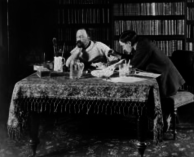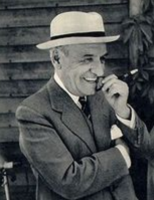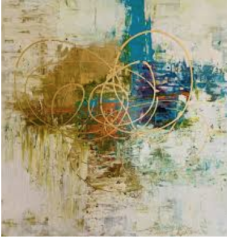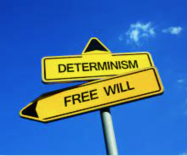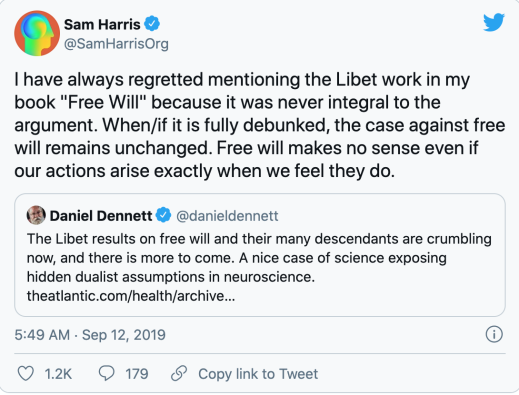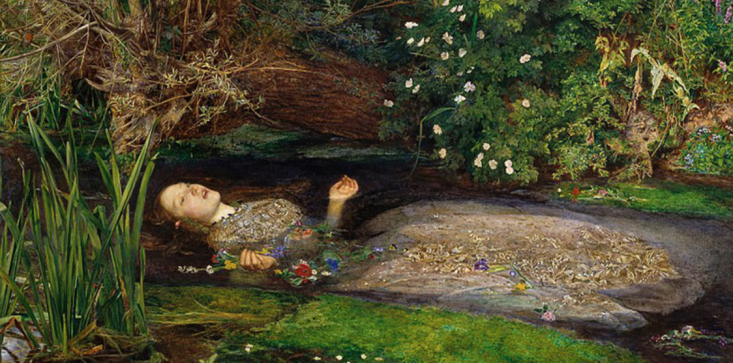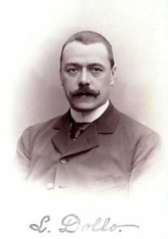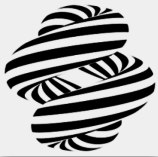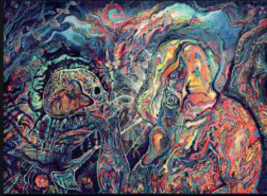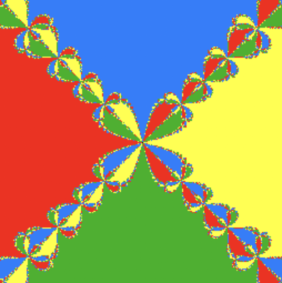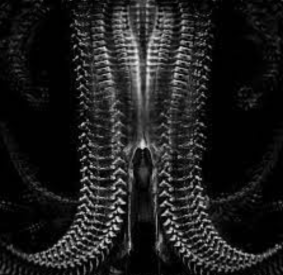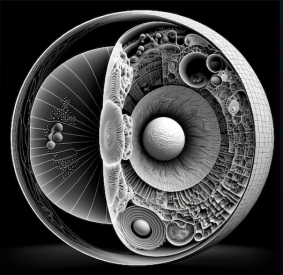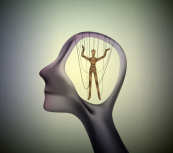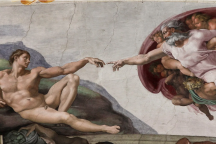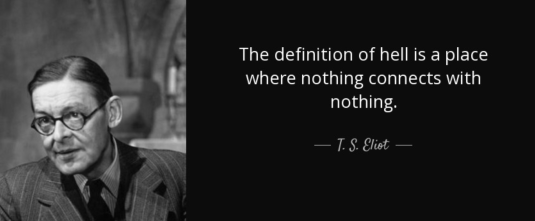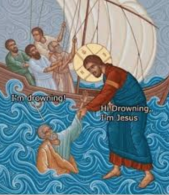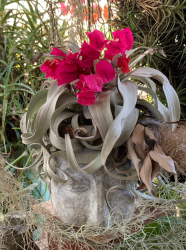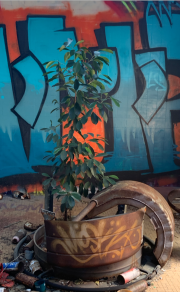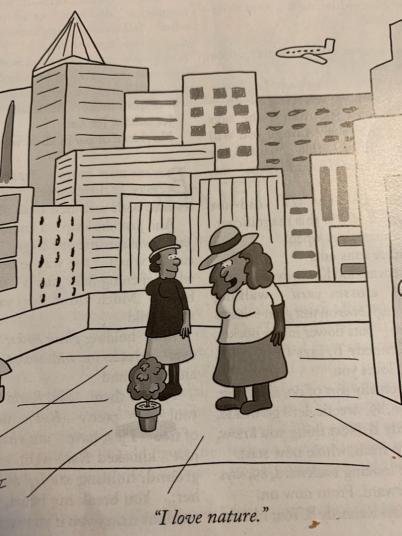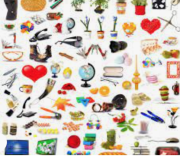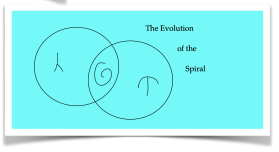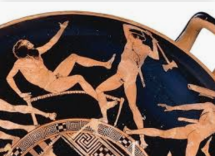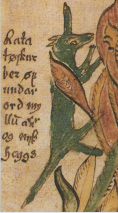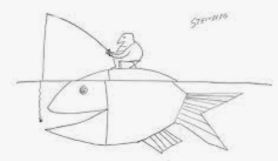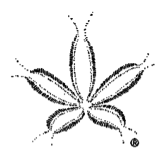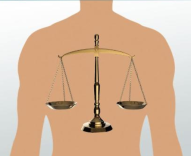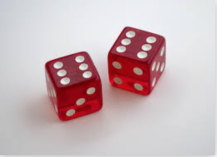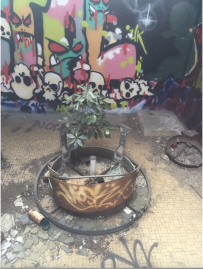Glossary
I love words. I love the feel of words in my mouth, the sounds of some words. Say, for instance the word 'nippable.' Say it aloud and voluptuously a few times. I was talking about 'nipping something in the bud' and heard myself saying, "Because it is in the bud when a thing is most nippable." This is how I approach acting, building out from the way the words feel in my mouth, in my body.
I have a tendency to make up words, like 'dysvestibulation.' I don't like avoiding using the word I want or need because a certain big part of my audience will be lost. I see that happening when I speak sometimes. There is a look in the listener's eyes telling me she no longer has any idea what I am talking about. One word will do it. I don't want to convey a message that one is deficient in not knowing the word nor do I want to speak down (a thing I do quite naturally being taller than most. I find I hear better sitting down.
This is how I hope to solve the problem. Words I know we little encounter in our daily conversations link to this glossary.
There are also familar words I may be using in an unfamiliar or idiosyncratic way. These too will be linked when I catch myself at it.
If you find any I miss or you have questions about please feel free to send a Comment. It may take me a while to get to some of these as some are very complex, like what do we mean when we refer to 'nature?.
We need to go deeper in our daily conversations and different vocabularies come into play when the needs become greater.
See also entry below, Glossary.
7, VII, (Seven)
The number 7 holds great significance in Western culture and is many remarkable features in number theory. It is because of its spiritual or mystical significance that Arthur Pauls chose 7 as the name of the method of "distance healing" that, by his report, was 'shown' to him in a dream/vision.
Pythagoreans attributed special significance to the number 7 because it consisted of the union of the physical (number 4) with the spiritual (number 3). Thus it was seen as representing the marriage of heaven and earth.
There may be a biological reason for the human attraction to the number "lucky" number 7 as it fits our attention span and our short-term memory span. 7 holds special significance in all of what are considered the major religions of the world.
Pauls showed a fondness of 7 in his later identifying 7 reflexes, and 7 errors. This may have derived from his strict Mennonite upbringing. Mennonites practice 7 sacraments. Though as an adult he rejected the Mennonite faith it likely left an impress on him.
Anthropology
A 'western' or European invention, much propelled by colonialism. It is a hermeneutical practice, this act of interpretation of the culture of the 'other' so as to be understood by this, the True Culture. Often practiced under the guise of great humility. Anthropology is a recognized branch of the Academy. The Academy is the keeper of the sacred Library, the Literature.
It blurs a lot with Sociology has a number of sub-branches. I like Visual Anthropology: "the anthropological study of the visual and the visual study of anthropology."
For a long time, it was the way in Anthropology to refer to any of those other cultures as 'primitive.' This word so tinged with its faint disdain. They are all to be sniffed at. In recent years has been recognized as pejorative and the language has shifted. But how long is the lag from language to practice, how deep runs the sense that how-we is how-best?
Here recall the simple unrecognized fact that movement is bidirection. I'm pretty sure there's a discussion going about the somewhere in this maze. Just let it pass as true for the moment. Jump into the subjunctive with me and together let's pretend it's true. If it's true, what can it do? Thus asks the Pragmatist.
Just a bit ago this had me wondering about Newton's Law about every action has equal & opposite reaction. I was struck by the metaphysical implications. Better it may read every action is its equal and opposite reaction, or every action is its reaction.
Movement as information demands reciprocity in hermeneutics. The arrow also points the other way as well. Information flows both ways. As Olive Pink, from her Alice Springs garden, was interpreting these "simple people" into written English these people, with equal or greater sophistication, had their own anthropological processes going. That body of 'literature' is not to be found in the Library, noncanonical.
I would dub this Apophatical Anthropology. Equal credence and attention. Mutual learning from. Perhaps revive the notion of condescension when it meant a noble thing but that word 'noble' begs the question.
Apophatic Medicine
This is not anti-medicine, it is the completion of medicine; not a deconstruction (which is mostly a critique, a kind of literature) nor even a reconstruction (with those connotations). Reconstituting, perhaps. We can go larger to apophatic sciences. The risk of the apophatic viewing of science is that it is often sensed by many of the scientists to be an attack and go on the defensive.
So life is studied as if it is a battlefield, an ever expanding arms race. The caterpillar attacks, the plant puts up a defense, the caterpillar counters. An unacknowledged assumption widespread in biology is that life is not all that welcome in the world.
I once asked Science, "What is the main thing you want?"
She considered for a bit then clearly decided declared, "Control."
Sure there's that pure hunger for knowledge, there are genuine humanitarian urges; control floats to the top.
It's a kind of pattern recognition, the more practiced you are at seeing it, the more it appears.
Apophatic is a strange word. It's quite an old concept but the word is seen by only that queer lot who study theology. There it is the finding of God in the negative. There are many threads and they go way back. It struck me when I encountered it, and has stuck with me because through orthobionomy I had been hosting apophatic ways but had not had that word. With me it was more about other things than god but various other domains of power and control.
One important name associated with the word at the dawning of modernity is Nicolas of Cusa. We are mid 1400s. Nicolas was many things, we could say he was a Rennaisance man. He was a priest––an important Cardinal––and a brilliant mathematician. It this latter area he was ahead of Copernicus and Newton. The title of one of his writings, Learned Ignorance. This caught by attention as it resonated with my practice of sitting with not knowing.
This is a text that is at the same time a text on number theory and theology. The two are inextricably wed and intertwined. Is the Holy Trinity but a metaphor of the triune nature of the Whole or does Mathematics flow out of the nature of God? I doubt Nicolus saw this as a pardox. Mathematics can make no clear claim to purity, bearing the stain of god.
Look at the dominant through where it isn't. Everything is defined by what it is not. This is the basis of cybernetics, the science of control in biological systems. The control lies within the absence. In a family system it is the secrets, the undiscussables. What can't be looked at determines the space and shape of a life.
Somewhere in this maze I tell a story about a laboratory monkey and a special relationship she has with a toy. See if you can find it (though I may have not written it yet).
Trauma has its apophatic aspect.
Apophenia
For Baelaeay
Having just heard my friend had died
I sat in my garden
recalling times with her.
Movement in the foliage
drew my eye
to a newly emerging monarch
First flexing her wings
preparing to fly off
into the world.
Like my fresh-transitioned friend
on to a new
mode of being
My heart leapt with
the butterfly's first flight
coincident with my friend's demise.
She is flying free after being
Tied down by
This tiresome body.
In mid first flight
a dark voracious form
swooped down and gobbled up.
Gone into a bulbul gullet.
I heard my friend's raucous laughter.
At least still flying.
Avoidance [see also (dis)Comfort]
Dr. Patricia Ressick defined Posttraumatic Stress Disorder (PTSD) as a failure to recover. Recovery is the natural and expected process, an expression of the drive toward well-being. The greatest barrier to natural recovery is avoidance. Wipe away whatever makes you uncomfortable, causes you anxiety. Many ways to wipe away. Alcohol and drugs the most popular. Distract with anger or with humor. Dissociate, check out. Social withdrawal, isolation.
Management by denial. The irony here is that what is unseeable, undiscussable, unacknowledgeable: these things control the system, drive the train. They are threaded in deeply.
We are witnessing an epidemic of grief avoidance. Escape to nostalgia, a symptom. Examples in popular culture: Nomadland, Wandavision, schlager-like music (Solar Power, Lorde).
Orthobionomy is not a practice of avoidance.
Bereitschaftspotential (Readiness Potential)
Hans Helmut Kornhuber and his doctoral student Lüder Deecke. 1964.
Go to Choice in Glossary.
Big question: what is actually being measured here? Does this (along with Libet) make a case against Free Will? No, but everyone seems to miss the reason. They identify a person as 'mind,' that continuously running story. If there is a leader part of a person doing something I would say it's body but there I am right back in enforcing the split.
Body
The body is the inscribed surface of events (traced by language and dissolved by ideas), the locus of a dissociated Self (adopting the illusion of a substantial unity), and a volume in perpetual disintegration.
––MICHEL FOUCAULT
I might have written the above as "The Body is the ..."
I am establishing a convention of capitalizing such words when referring to the overall concept versus the individual items sorted into that box.
Most usage of this word body (in western writing) either restricts it to refer only to the meat body. Person's body is the fleshy parts of the Person. This is a reductionist perspective.
Ortho-Bionomy implies, in creating a concept of 'phases' expands and extends the territory of the body. It includes other bodies (social body) and ultimately a relation of inseparable difference between Body and World. There is no clear boundary between Self and Other. The word "scope" can be synonymous with "phase." There are many words that use metaphor to discern. What you see depends on the "lens" you use. What you can do is dependent on what theory you are using (paraphrasing Einstein). Orthobionomy ascribes to the holistic credo of its parent osteopathy.
There is a growing stream of holism, springing from within and as well from the "east," and various "indigenous" directions. To see an essential wholeness is the challenge.
The bias toward individualism and reductionism are built into the language and language (logos) directs thinking.
There is much to be said about the Body Schema. One may start by clicking the kink above to the Wikipedia entry. We go much further with the concept until it's well over our heads. Go HERE for a more full account. I distinguish it from Body Image.
For Merleau-Ponty the body schema is also the basis of "intercorporeity," i.e., a prepersonal sphere of reciprocal comportment and understanding prior to any explicit consensus and symbolic communication.
Happens behind the scenes of awareness and how the body anticipates and sets the stage for consciousness.
See Shaun Gallagher, How the Body Shapes the Mind.
See Revisiting the body-schema concept in the context of whole-body postural-focal dynamics
for an account of the origin of the body schema concept and some current research directions. From this article:
In summary, we view the body schema as a set of fronto-parietal networks that integrate information originating from regions of the body and external space in a way, which is functionally relevant to specific actions performed by different body parts. As such, the body schema is a representation of the body’s spatial properties, including the length of limbs and limb segments, their arrange- ment, the configuration of the segments in space, and the shape of the body surface; it can also incorporate, after suitable training, the spatial/dynamic properties of tools employed by skilled users (Maravita and Iriki, 2004). As a constantly updated postural model that keeps track of limb position, it plays an important role in the control of action and it involves both central and peripheral neural systems. In this framework, the contribution of cybernetics (in its different aspects, as dynamic systems theory, neural network the- ory, control theory, etc.) is basically to provide a (mathematical) language for representing and understanding the complexity of the dynamic interactions of neuromuscular/neurocognitive processes and to make predictions based on the simulation of the mod- els. Thus, the body schema can be characterized by the following computational features:
-
It is spatially encoded, in the sense that it represents both position and configuration of the body as a three-dimensional object in space (Macaluso and Maravita, 2010);
-
It is distributed and modular (Haggard and Wolpert, 2005), because it is not represented in a single region of the brain and it involves a number of interacting modules, as fronto-parietal loops;
-
It is intermodal/supramodal, in the sense that it integrates pro- prioceptive and tactile information for maintaining a 3D body representation, variable in time, while preserving its functional identity; moreover, this representation is also modulated by other sensory channels, e.g., vision, as a function of specific task constraints and environmental conditions. This suggests that the body schema is somehow responsible of integrating the different sensory modalities in such a way to achieve an abstract or amodal representation (Haggard and Wolpert, 2005), while preserving an action-oriented overall coherence1 ;
-
• It is characterized by a short-term plasticity and reorganization on the timescale of seconds, as shown by the quick integration of tools into the body schema.
Body Schema / Body Image
Body schema is a system of sensory-motor capacities that function without awareness or the necessity of perceptual monitoring. Body image consists of a system of perceptions, attitudes, and beliefs pertaining to one's own body.
Boundary
Relationship. Life happens in a boundary. We think of this side and that side and a line between. Go into the line. You are the boundary. One leg of the three-legged stool, the holy trinity.
A boundary is not a line separating but a zone of convergence, of meeting. It is mucus.
Brute Fact
I keep coming back to this notion. I used to have it backwards, that brute facts were those things that could not be argued about. They are rather those fact-things that can be argued endlessly about with no sophisitc way to get around it. You just choose a side––or be assigned a side. Is there a middle path, a cleaving to the tension field between the two? Good luck, maybe; bad luck, maybe.
I do still think of things like gravity as a brute fact. There's nothing any of us can do about it, stuff has a draw to it for other stuff. The whole list of laws of physics I tend to put inside that box, The 2nd Law of Thermodynamics with her three siblings. E=MC2. Do an archaeological dig on these 'laws' and I find a white streak fractaling through it. Mathematics has a God-stain.
How can I bleach the whiteness from my thinking? Is this ground of
A brute fact is a question that can't be settled. Perhaps the universe has no state that corresponds to our (white?) notion of "settled."That 'goal' appeals to me; being peacefully unsettled.
Brute Fact is the 'battlefield' (a freighted metaphor itself), The site of struggle to be the Official Keeper of the Truth. And just as convincingly Brute Fact is the site of engagement, the Field of the Lord, the possibility of that field beyond.
Right now Free Will is on life support. Free Will is being called to prove that it is a Brute Fact. Try living for a day with the assumption that all your decisions are being made for you while gaslighting you to feel convinced that you are making the choices. The case against this notion is pretty strong. If Free Will is a thing that exists in the universe it does not reside in the human mind but at some great remove.
The character of Chidi Anagonye of the TV fantasy comedy, The Good Place lived in that hell of not being able to decide while convinced he must decide, his would depends on it. All arguments on poised on the point, no clear ground (of 'logic')) on which firmly decide. On the other side of the see-saw scale are the risks of "swimming in the chaos." All under the inescapable sway of the 2nd Law of Thermodynamics? Again a white-side view of Brute Fact.
Is there a stillpoint within this everchurn?
Is The Possible Impossible a synonym?
Orthobionomy is organized abound the assumption that there is the possibility of sitting in the still point.
Category (see also "Concept" below)
'Category' is a concept. It is the idea that everything can be neatly divided and dumped into is own box. A box named Cats. A tank named Fish. Then it's boxes within boxes. A the concept of categories Imaginges clear, bright lines delimiting the containers. Elision is elided. Blurriness is ignored. The process is called reification, making imagined things become true things.
Chaotic Journey
I am working out what I mean by this. I am wanting to use it as a title for what/how I teach. The phrase first popped into my awareness from Edouard Glissant, Poetics of Relation. He used it as a synonym for thinking free from cultural constraints. That's how I read it. I found this painting by Garnet Bernard LeMaire while searching Google for images. As noted I have requested permission and I am wondering if I legally or ethically need permission for this use, as in quoting. I feel ethically in balance with her thus far, have taken some effort to point you to her (click on her name above) and more of her creations. Artists need to be honored. Artists wield magic*.
I have been doing some reading and thinking about Chaos Magic(k) and magic in general because chaos and magic have a lot to do with one another. I am in process of defining/describing what I mean by magic*. When I mean magic to mean what I mean by magic that magic* will be asterisked and italicized.
Magic and Science are equally vulnerable to chicanery and quackery though it often seems to be that magic quacks the louder. Grifters drift and settle all along the range. All the laws of physics are probablistic. Inseparable differences, the possible impossible.
Science cannot avoid the taint of magic no matter how much he tries to hoover it out. The discipline is the expurgation of magic.
Science is One World, Universe, Time. Magic* is Many Worlds (Real World), swarming, foaming, fractal-coalescing; delighting in the Carnivalesque (this is a reference to Mikhail Bakhtin which see in Sources).
The Chaotic Journey is a title I am using now for some possible series of workshops I would like to lead. All about orthobionomy and some teaching Ortho-Bionomy.
Why organize it this way? Why the confusion and uncertainty? I think about the Korean film Parasite and the father's falling back to the plan of no plan. I think, too, of The Expanse, being in the churn.
What strategies are available for healing in the story between stories? What is the direction of the healing? Remembering that movement is always bidirectional, a thing that can be difficult to notice in our either/or world.
Choice, Free Will
I can't find that this question has been settled. Likely one of those brute facts areas, can't be settled. And maybe this is what keeps things running.
Is it interesting that all these words, 'choice,' 'free,' and 'will' are Old English words, not thrust upon us by the Romans. Is this significant?
Free Will seems to have been taking a bit of a drubbing of late but I would expect it to hang in there. But "which is the right answer" is perhaps not the point. The point is the wobble and quibble of magic*. I will not argue for one or the other. Thee are fat books from mind fare more brilliant than mine. If you think it's important what you happen to believe about this (All in for Free Will!) go find your Authors. Watch "The Good Place."
Wherever you are left hanging on a cusp you are sitting in the possibility of magic*. Say it's the one (Determinism) and act as if it's the other (Free Will).
Personally I keep getting surprised at how anti-Free-Will I find myself. I delight at the Libet experiment. And this may be just because it goes so much against the cultural current. I chose to oppose. Or is it my nature to go au rebours (against the grain)? You see, it can just keep going round and round.
Take this into gender politics. The politically acceptable story is "I had no choice; Nature made me who I am." (Take note of that messy word 'Nature' and recall how messed into that concept we are.) To suggest he decide to be she is taken as a hurt. But how about, "You have made a choice about how you want to present yourself to the world and I must respect that choice, and I do not need a story.
(dis)Comfort
One of the misunderstandings in Ortho-Bionomy. The 'rule' in finding restorative positions is "move toward comfort, away from pain." The problem occurs when this gets turned into a rule for living. Some years ago, looking at the demographically at the Society of Ortho-Bionomy International what stood out is that it is dominated by white women of a certain age. I asked the board if we might examine what barriers we have unwittingly erected for people of color? Shouted back, "We don't have any barriers." A naive retort. Even if they are invisible to the ones who put them there the barriers are real and effective. And here is something embedded as philosophy in the presentation of the work.
"Discomfort is forbidden? This is old white lady territory. I'd better stay away or I'll be doing all her work to keep her comfortable. Can't stand those white women's tears."
An insistence on comfort
Concept
I thought I knew what a concept was until I read (tried to read) the philosopher Jerry Fodor's book, Concepts. Then I knew I hadn't a clue as to what a Concept is. I'm figuring it out for myself now. A concept is an imaginary thing, which is to say it is not a thing at all.: A concept is a non-thing thing. Concepts are not true things but things that are believed into being true. This is what Stephen Colbert coined the word 'truthiness' to reflect. You know it's true because You think it's true. It may be something you strongly wish were true and you find someone with the same hope/wish and clusters form and networks; pressure is exerted in that direction and it's on its way to becoming true (I stress the inchoative).
[I hope to come back sometime and write more about this.]
Highly overrated in my opinion. More on this will be coming. Until recent times this has been a taboo topic of any research and any reputable scientist who ventured, however tentatively, into the forbidden land suffered professional consequences. The doors have been opened an so we will see where it goes.
A recently proposed hypothesis is forwarded by philosopher Riccardo Manzotti. Simply stated, "...the thing that is my conscious experience is not an inner ghost but the very object I am conscious of." This fits well with my orthobionomy experience and parallels Turner's extended organism.
Death, Dead
Death is a culturally invented concept.
Default Mode Network (DMN)
Dorsal and Ventral Attentional Networks
Dichotomy
It's more likely a continuum, a range of a scale, a matter of degrees.
Most dichotomies turn out to be false dichotomies.
Dollo's Law
Dorothy Parker famously quipped of Doris Day, "I knew her before she was a virgin." We all have a sense of the arrow of time, which is why this statement is jarring. This is what Dollo's law is about, the irreversibility of that arrow. Louis Dollo (1857 – 1931) was a Belgian paleontologist, noted for his work with dinosaurs. What his law asserts (really a hypothesis) is that a structure or organ lost during the course of evolution would not reappear. This "law" has had its ups and downs and usually is restricted to evolutionary theory. It has broader application in biology with its base in the theory of entropy and the irreversibility of the arrow of time. I consider some variation of Dollo's Law to make it on my ist of laws of life. We have our aphorisms: "You can't go home again," (stated in another way by Gertrude Stein when she revisited her hometown of Oakland CA, "When I got there there was no there there."); or Heraclitus's "No man ever steps in the same river twice, for it's not the same river and he's not the same man." There always seems to be a part of though that dreams of return and the myth of a golden age; "make America great again," return to some edenic time. Return to earlier functioning after trauma. Fantasies. Rather align with reality and work towrd acceptance and accommodation.
Emotion
After an exhaustive exploration of the etymology of the word emotion, Maxine Sheets Johnstone (The Primacy of Movement) goes on...
The above various etymological usages strongly suggest that as the word is commonly used and understood today, emotion arises out of or from motion, motion in the sense of felt dynamic stirrings, felt inner commotions –– a bodily "earthquake" as it were, spanning a strikingly varied range of possible magnitudes or intensities. The commotions, being thoroughly dynamic in nature, are thus quite inadequately described as "the welling up of an impulse within" [as described by Evan Thompson in Mind in Life]. Though Thompson goes in to point out the "Close resemblance between the etymological sense of emotion –– and arrow directed at a target, and by extension the min's aiming outward or beyond itself toward the world," concluding that '[b]oth ideas connote directed movement", he remains tethered to language and stops short of investigating emotions themselves and the dynamic congruency of emotions and movement. It is, in short, not enough to connote movement, whether ideationally or linguistically. To begin with, impulse does not do justice to the dynamics of emotions which do not just motivate movement. As indicated above, they inform movement every step, turn, gesture, ching, or quivering of the way. Indeed, the affective quiverings, tensions, lightnesses, shudderings, pressures, constrictions, extensions, heavinesses, and so on, that one feels in a thoroughly corporeal sense in anger, anticipation, compassion, worry, and shame, for example, are ongoing dynamic affective happenings. Hence, whatever the dynamic stirrings and informing, they are qualitatively distinct, which means they have a formally recognizable bodily-felt character. A normal individual does not confuse his or her feelings of sadness with those of embarrassment or pride, for example, those of fascination with those of contempt, those of anxiety or annoyance with those of conviction to hostility. It is important to note explicitly in this context that although there are words for emotions, names that duly label them as those just mentioned, "the things themselves" are not objects like tables and chairs, and indeed are not things to begin with. On the contrary 'the things themselves' –– emotions –– are dynamic processual happenings. They are not states of being but precisely moving phenomena that are movingly experienced, not only in the sense of a dynamic congruency between affect and movement –– real-live feelings of fear being dynamically congruent to real-live kinetic feelings of running away, real-life feelings of joy being dynamically congruent to real-life kinesthetic feelings of running toward –– but in the sense of emotions themselves, which are not static entities, but phenomena that run their course, waxing and waning, exploding, attenuating, constricting, expanding, bubbling, reverberating, all in ways that can be intricately subtle and complex. In a word, emotions move through the body at the same time that they move us to move. Again, they do so in distinctive ways: fear moves the body and moves through the body in ways different from trust; delight moves the body and moves through the body in ways different from grief. In each instance, we are not simply "acting" or "behaving." We are caught up in the dynamics of the immediate life we are living, even as that immediate life might be focused or fixated on past or possible future happenings or on riveting aspects of our immediate situation. In sum, we are first and foremost animate beings who, in being animate, are alive to our animateness, which is to say that whatever affects us moves through us, permeating the whole of our being and moving us to move in ways dynamically congruent with the ongoing stirrings and commotions we feel. It might be noted that such understandings of our foundational animation anchor concepts such as pre-reflective self-awareness in the dynamic realities of kinesthesia and at affective/tactile-kinesthetic body. [Emphases are in the author's.]
Entheogen
Literally "becoming divine within." The word was coined from Greek roots in 1979 by an informal group of ethnobotanists and mythologists studying the inebriants of shamans (I would like to know more about this 'committee.' The word is used to refer to substances with certain psychoactive properties. It can include pharmaceuticals (like LSD, MDMA, ketamine) and botanicals (like Peyote, Amanita muscaria and other mushrooms, yerba santa, ayahuasca). They are assuming an important role in therapy and should be considered very carefully for 'entertainment.' Many of these seem to have the ability to change your mind. They have a strong magical* association, as in 'magic mushroom.' They (the botanicals) are also of religious importance in many cultures. Most traditional medicines cannot be known separate from the religion. Wikipedia. has more on the topic.
Escape Distance or Flight Zone
"A specific spatial computation that can proceed in the animal's head in the absence of any obvious fear or escape." See Graziano.
Ethics
"Moral scar"
https://www.wnycstudios.org/podcasts/otm/segments/moral-burden-pandemic-decision-making-on-the-media
Free Will (is it real?)
First I would point you to a useful article in Scientific American. Bernardo Kastrup gives a brief and cogent account of the current state of the free will argument.
Do I have the free will to insist on or deny free will? I feel as if the I that is feeling is a univocal entity: that's me thinking, feeling, choosing. This was the assumption of Erwin Schrödinger as he gave his physicist's view of free will in his little book "What Is Life?"
But I am an assembly of multiple interests and it is a political process, running in background, Mostly unknown processes of signaling, perhaps grounded on or somehow akin to bacterial quorum sensing, send along a verdict to 'me' informing 'me' what our consensus is, what to do with an urge.
Do I need to have an opinion, be for or against, choose sides? Consider ballroom dancing, Fred and Ginger. One leads, the other follows. But comes the case where both are feeling as if they are being led. In Ortho-Bionomy this might be called a Phase Five sort of state; both feel convinced they have surrendered agency to the other, there is a flow we are entrained into. Of course it is demonstrably too easy to trick yourself (what happened to that unity of the 'I'?) into being convinced it is not I who am leading when in fact I am. Thus 'muscle testing' is proved to be an unreliable form of interrogation.
As light depends on darkness freedom cannot exist without constraint.
Can it ever be truly decided: is our every act determined or do I act unconstrained? Kastrup points out that an undetermined act is random, pointing out how weak is our understanding of randomness. It is our free will that allows us to surrender our free will to do 'what is right." Because we could (and often do) things that are not right. Dante did not think it was decidable. His suggestion was that it was best to act as if you have free will. In this way, we will free will into being, like Rilke's Unicorn?
Geopraxis
Earth plus action with reflection gives us this word. Practices that consider place (placement, orientation, positioning) as important elements of health and well-being. Becoming aware of and responsive to the subtle interplays of Where You Are with Who You Are. Developed by Richard Valasek following principles of orthobionomy and interrogating certain practices of Ortho-Bionomy, e.g., Phase 6 and Phase 7. Various aspects of Geopractic are being included by a growing number of Ortho-Bionomy instructors.
Glossary
Glossary: for readers from elsewhere, who don't deal very well with unknown words or who want to understand everything. But. perhaps to establish for ourselves, ourselves as well, the long list of words within us whose sense escapes us or, taking this farther, to fix the syntax of this language we are babbling. The readers of here are future.
–– Édouard Glissant, Malemort
God
If one concedes that one knows virtually nothing about God then one can begin to recover the presence of holiness in the flesh of ordinary existence. ––RICHARD KEARNEY
If I said decisively: 'I have seen God,' that which I see would change. Instead of the unconceivable unknown––wildly free before me, leaving me wild and free before it––there would be a dead object and the thing of the theologian––to which the unknown would be subjugated. ––GEORGE BATAILLE
Monotheism––only one God–– contrary to what we are usually taught, is a modern concept, making its first appearance in 1698 (See Keller).
My question around this now: did the collapse of gods (polytheism) into one God have anything to do with the rise of reductionism, in the sense of the word as used by Mary Midgely? One world view (Science), one language (English) dominating and eliminating competing worlds and stories.
Biting off a big chunk here and probably out of my depth but...
Soon, I hope, there will be a pointer here to the theology (theopoetics) of orthobionomy and an explanation of why theology should be mentioned in connection.
_____________
I recall having once been asked by the serious face of a devout fundamentalist Christian sister-in-law if I believe in God. I was not up to any pointless theological discussion with her so I simply said yes. This answer was (and continues to be) both lie and truth.
I am still unconvinced that it's a pretty much irrelevant question to begin with. But having some good idea the God image she asked about I certainly have no sort of belief in. I cannot deny that embryonic trace images are retained from childhood.
There is a fact of god, that I know. This is not a belief in god. The fact I know is that a lot of people believe in some notion of God. This belief, whatever form it takes, results in choices of action that change the world. In this sense, god or God is working in the world.
Another fact I know about god, from readings in various theological literature, is that god is presented as all sorts of things. We don't need an exhaustive list with citations: The totality of creation. Love. Possibility. Change. Consciousness. Process. A power higher than yourself. A trickster. Deeply involved with humanity vs barely noticing us. Many or One. Unknowable. The list can go on and on.
Let's say I call to mind one of these when asked that unnecessary question and I say yes. Let's say I choose Unknowable God. Let that sink in. Do I believe there is much that is unknowable, inaccessible to human senses and consciousness, and an understanding that being is dependent upon this unknowablity? Yes. Can I call this god? Why not?
Once unmoored from that God one can still hang on to god as a concept and latch it on to any number of possible words as synonymous. Whatever appeals to you.
Healing, Healer
Is hardly ever the right word but I have not found a better yet Every time I use the word it is somehow qualified. This word is a constant source of conversation in classes. People have strong reactions.
Healing Presence
Advances the notion that you are sufficient to promote healing in the world. This is the basic teaching of orthobionomy. Involves a stripping away of technique; letting go, unlearning.
Immune System
Among the wealth of cognitive novelties under the modern sun, none are remotely comparable in their far-reaching consequences to the appearance and propagation of immune systems in the biology of the late nineteenth century. From that point on, none of the scientific integrities – animal organisms, species, ‘societies’ or cultures – could remain the same. Only hesitantly did people begin to understand that the immune dispositifs are what enable systems to become systems, life forms to become life forms, and cultures to become cultures in the first place. It is only by virtue of their immunitary qualities that they ascend to the level of self-organizing unities, preserving and reproducing themselves with constant reference to a potentially and actually invasive and irritating environment. These functions are performed to an impressive degree in biological immune systems – whose discovery resulted from the investigations of Ilya Mechnikov and Robert Koch’s student Paul Ehrlich at the end of the nineteenth century. There one finds the baffling idea that even relatively simple organisms like insects and molluscs have a native ‘foreknowledge’ of the hazards that accompany a typical insect or mollusc life. Consequently, immune systems at this level can be defined a priori as embodied expectations of injury and the corresponding programmes of protection and repair.
Viewed in this light, life itself appears as a dynamics of integration that is equipped with auto-therapeutic or ‘endo-clinical’ competencies and refers to a species-specific space of surprise. It has an equally innate and – in higher organisms – adaptively acquired responsibility for the injuries and invasions it regularly encounters in its permanently allocated environment or conquered surroundings. Such immune systems could equally be described as organismic early forms of a feeling for transcendence: thanks to the efficiency of these devices, which are constantly at the ready, the organism actively confronts the potential bringers of its death, opposing them with its endogenous capacity to overcome the lethal. Such functions have earned immune systems of this type comparisons to a ‘body police’ or border patrol. But as the concern, already at this level, is to work out a modus vivendi with foreign and invisible powers – and, in so far as these can bring death, ‘higher’ and ‘supernatural’ ones – this is a preliminary stage to the behaviour one is accustomed to terming religious or spiritual in human contexts. For every organism, its environment is its transcendence, and the more abstract and unknown the danger from that environment, the more transcendent it appears.
Sloterdijk, Peter. You Must Change Your Life (p. 8). Wiley. Kindle Edition.
Inchoative (grammar)
Verbs meaning beginning to do something, suggesting an ongoingness of a process. Also called inceptive verbs. A state of always beginning/becoming.
Jesus, Trickster Jesus
Jesus has the remarkable ability to be whoever yoy think you want him to be. A lot of things are attributed to him but the biblical Jesus is already a committee, not just one person speaking, what others think he might have or should have said. Jesus in America is an interesting book. There are many traits that suggest Jesus's closest cronies are of the Trickster Clan. A good example of Jesus turning the trap was when he said to his inquisitors, pointing to a coin of the realm, "Render unto Caesar ... '
The interpretation of body motion communication such as faical expressions and gestures facial, nonverbal behavior related to movement of any part of the body or the body as a whole. The equivalent popular culture term is body language, a term Ray Birdwhistell, considered the founder of this area of study, neither used nor liked (on the grounds that what can be conveyed with the body does not meet the linguist's definition of language).
Of particular relevance for the Phase 5 focus. So much so Kinesics could be a replacement name for the confusing and idiosyncratic Phase 5.
Language
Laws of Life
As the word 'Ortho-Bionomy' was coined to mean "the correct application of the laws of life" I am surprised to see that I am only now (30 Aug 2021) making an entry here. Though there has been an essay under way for a while. I thought to do it now because, in working on an entirely different essay (Unphased), I made reference to some writing by CS Peirce and I wanted to site a specific reference. In trying to find the particular writing of Peirce's I had read (some time ago) I came upon this paragraph in the Stanford Encyclopedia of Philosophy entry "Charles Sanders Peirce."
What the directly measured facts of scientific practice seem to tell us, then, is that, although the universe displays varying degrees of habit (that is to say, of partial, varying, approximate, and statistical regularity), the universe does not display deterministic law. It does not directly show anything like total, exact, non-statistical regularity. Moreover, the habits that nature does display always appear in varying degrees of entrenchment or “congealing.” At one end of the spectrum, we have the nearly law-like behavior of larger physical objects like boulders and planets; but at the other end of the spectrum, we see in human processes of imagination and thought an almost pure freedom and spontaneity; and in the quantum world of the very small we see the results of almost pure chance.
You may see from this that the very notion of Laws of Life is an absurd proposition, which explains why there are no widely recognized 'laws of life.'
Letting Go
By letting go it all gets done. The world is won by those who let it go. But when you try and try, the world is beyond the winning. ––LAO TZU
One of the symbols of Phase 7 (see entry below) of Ortho-Bionomy represents the act of Letting Go. It looks like an inverted letter 'Y' and Pauls referred to it as the Releaser or sometimes the Volcano (as an expression of the release of built up tentsion. Opposite Letting Go in the dialectical field of Phase 7 is the symbol for Holding On. Pauls called this symbol the stabilizer or the mushroom. The symbol looks like the letter 'T' but with a downcurving cross bar,, like a mushroom in cross sectionl. This dynamic is equivalent to the Constraint––Freedom dialectic proposed by American pragmatic philosopher C.S. Pierce.
Neuroscience is suggesting that it is also the same as the two brain functions whose interplay is currently thought to be a possible source of Consciousness: the Deafult Mode Network (DMN) and the Dorsal Attentional Network (DAN). The latter is engaged under outer-focused, world-engged, problem-solving activity. The DMN gets active when the DAN is not and is inward,focused, having to do with the autobiographical self as well as (suggests Lieberman) social relationships.
See: Temporal circuit of macroscale dynamic brain activity ssupports human consciousness.
Life
What was life? No one knew. It was aware of itself the moment it became life, that much was certain—and yet did not know what it was. Consciousness, as sensitivity to stimuli, was undoubtedly aroused to some extent at even the lowest, most undeveloped stages of its occurrence; it was impossible to tie the emergence of consciousness to any particular point in life’s general or individual history—to link it, for instance, to the presence of a nervous system. The lowest animals had no nervous systems, let alone a cerebral cortex, and yet no one dared deny that they were capable of responding to stimuli. And you could anesthetize life, life itself, not just the special organs capable of the response that informs life, not just the nerves. You could temporarily suspend the responses of every speck of living matter, in both the plant and animal kingdoms, narcotize eggs and sperm with chloroform, chloral hydrate, or morphine. Consciousness of self was an inherent function of matter once it was organized as life, and if that function was enhanced it turned against the organism that bore it, strove to fathom and explain the very phenomenon that produced it, a hope-filled and hopeless striving of life to comprehend itself, as if nature were rummaging to find itself in itself—ultimately to no avail, since nature cannot be reduced to comprehension, nor in the end can life listen to itself.
What was life? No one knew. No one could pinpoint when it had emerged from nature and struck fire. Nothing in the realm of life was self-actuated or even poorly actuated from that point on. And yet life seemed to have actuated itself. If anything could be said about it, then, it was this: life’s structure had to be so highly developed that nothing like it could occur in the inanimate world. The distance between an amoeba—a pseudopod—and a vertebrate was minor, insignificant in comparison to that between the simplest form of life and inorganic nature, which did not even deserve to be called dead—because death was merely the logical negation of life. Between life and inanimate nature, however, was a yawning abyss, which research sought in vain to bridge. People endeavored to close that abyss with theories—it swallowed them whole, and was still not an inch less broad or deep. In the search for some link, scientists had stooped to the absurdity of hypothesizing living material with no structure, unorganized organisms, which if placed in a solution of protein would grow like crystals in a nutrient solution—whereas, in fact, organic differentiation was simultaneously the prerequisite and expression of all life, and no life-form could be proved that did not owe its existence to propagation by a parent. What jubilation had greeted the first primal slime fished from the sea’s deepest deeps—and what humiliation had followed. It turned out that they had mistaken a precipitate of gypsum for protoplasm. But to avoid one miracle (because it would be a miracle for life spontaneously to arise out of and return to the same stuff as inorganic matter), scientists had found it necessary to believe in another: archebiosis, that is, the slow formation of organic life from inorganic matter. And so they went about inventing transitional and intermediate stages, assuming the existence of organisms lower than any known form, but which themselves were the result of even more primal attempts by nature to create life—attempts that no one would ever see, that were submicroscopic in size, and whose hypothesized formation presupposed a previous synthesis of protein.
What was life, really? It was warmth, the warmth produced by instability attempting to preserve form, a fever of matter that accompanies the ceaseless dissolution and renewal of protein molecules, themselves transient in their complex and intricate construction. It was the existence of what, in actuality, has no inherent ability to exist, but only balances with sweet, painful precariousness on one point of existence in the midst of this feverish, interwoven process of decay and repair. It was not matter, it was not spirit. It was something in between the two, a phenomenon borne by matter, like the rainbow above a waterfall, like a flame. But although it was not material, it was sensual to the point of lust and revulsion, it was matter shamelessly sensitive to stimuli within and without—existence in its lewd form. It was a secret, sensate stirring in the chaste chill of space. It was furtive, lascivious, sordid—nourishment sucked in and excreted, an exhalation of carbon dioxide and other foul impurities of a mysterious origin and nature. Out of overcompensation for its own instability, yet governed by its own inherent laws of formation, a bloated concoction of water, protein, salt, and fats—what we call flesh—ran riot, unfolded, and took shape, achieving form, ideality, beauty, and yet all the while was the quintessence of sensuality and desire. This form and this beauty were not derived from the spirit, as in works of poetry and music, nor derived from some neutral material both consumed by spirit and innocently embodying it, as is the case with the form and beauty of the visual arts. Rather, they were derived from and perfected by substances awakened to lust via means unknown, by decomposing and composing organic matter itself, by reeking flesh.
Mann, Thomas. The Magic Mountain: First Edition (Barvas Fiction) . Barvas Books. Kindle Edition.
Life
There is currently no consensus regarding the definition of life. One popular definition is that organisms are open systems that maintain homeostasis, are composed of cells, have a life cycle, undergo metabolism, can grow, adapt to their environment, respond to stimulie, reproduce, and evolvve. Other definitions sometimes include non-cellular life forms such as viruses and viroids.
Logos
I will use this word more in line with Heraclitus than in the later Christian sense though they are not that different. In the Christian usage, "In the beginning was the Word, and the Word was with God, and the Word was God" (John 1, KJV). Heraclitus wrote that Word (reason, account, language) and World are in accordance. He used a metaphor of fire to clarify the relationship; it is non-linear.
Ludic Space
The place of Play. How safe a space must it be? What do we trade for safety? Is there always danger inherent in play. How much falling down do we do to be able to walk without falling down? Is PTSD (qv) is a desparate fixation on safety?
Metaphysics
[maybe someday]
Metatherapy
Therapy applied to therapy itself. What does it mean to say a thing is therapeutic?How a person becomes a better therapist more through unlearning. Gardens require pruning, even my feral garden.
Minimalism (Less is More)
Robert Browing, in the dramatic monologue or 1855, "Andrea del Sarto" has Anrea say to his wife Lucrecia, "Well, less is more, I am judged." Further in the poem is the other famous line, A man's reach should exceed his grasp else what's a heave for?"
When asked the source of the phrase most people will think Mies van der Rohe. It was the summation of his architectural philosophy and he oft repeated the phrase. He, however, heard it for the first time in 1907, said to him by his master, Peter Behrens.
Exploration of this idea that less can be more is foundational to much of modernism and most especially in the various movements of minimalism.
Art historian and art critic, Michael Fried, has famously criticised minimalism (wrting about minimalis sculpture) as being "theatrical" and meaning this as a negative thing. It is interesting that the firts famous use of the phrase was in a dramatic monologu.
I don't get why Fried thinks theatricality wrong.
Minimalism, less-is-more, is a critical aspect of orthobionomy. being present more as a witness than an effector (and thus being more effective). Pauls liked to pare a move down to the merest gesture and then the thought or possibility of the gesture. He saw it as akin to the distillation of homeopathy. But that gets on to another topic, one I'd just as soon pass by.
There are many reasons to move toward an ever greater economy of effort. All this could be the basis of a book of ist own or at least (best) a workshop.
Mood
See Phase V, below
Movement
Not ambient movement. Mostly about walking across the room and picking up a pen kind of movement. Extrinsic more than intrinsic (but I hope to get to that intrinsic motility category of movement).
Extrinsic, purposive movement is the kind I pay most attention to. I also call this biologic movement. It is found only in living creatures. It happens embedded in a Heraclitean background movement. I suspect that what creatures do is latch on to movement.
Major Premise: Movement is bidirectional.
It's important to spend a lot of time with the feel Iof movement, imagined movement. We play some games to get the feel of it. Like going back to childhood, learning the most complex and demanding things in your entire life while you were having too much fun to notice you were learning. Learning to walk, learning to talk. Movement is so much taken for granted that we don't notice it's the base of everything we hold to be important in being a living being.
Mucus
Mucus is underappreciated. The word lands in the same semantic basket as things like snot and slime and scum. It’s gooey, runny, drippy-sticky. It is yucky. There would be no life without it. In a meta-way life is a complex mucus, Simple mucus, as in a glycopolysaccharide, is a molecular model of Holding On and Letting Go. We could catalogue the important physiological roles that mucus plays. It coats our epithelial linings. In the stomach it preventing our juices from digesting the the stomach vat as well as the organs of secretion. Lining the airways it has an immune function, trapping and expelling that which might do harm.
A contronym (or contranym) is a word having two meanings that contradict one another. Which meaning it takes depends upon context. The first word I came to know to be a contronym is cleave. It can mean to stick to, hold on, or it can mean to split apart from, to separate; cleave to or cleave from. Mucus is an embodiment of a contronym.
neba-neba
Nature
Deleuze and Guattari claim in Anti-Oedipus, "we make no distinction between man and nature: the human essence of nature and the natural essence of man become one within nature in the form of production or industry, just as they do within the life of man as a species."
The term 'Nature' needs to be interrogated.
Too much to say about this complex concept. One of our more curious fictions. Another one of those nonseparable differences Keller writes about. I have two entries for 'Nature' because there are two basic views of nature. One sees nature as separate from humans, something that we have negative effect on. This view puts emphasis on free will. The other is that we are an expression of nature and really had no choice in actions we take. We are Nature expressing herself.
Humans arose out of Nature and likely have little actual say in what we do. To say that humans are a threat to Nature is the same as saying Nature is suicidal. Systems of increasing complexity may have a 'natural' limit. They serve under the 2nd law of thermodynamics to manage an energy differential. Can humans act outside the' Laws of Nature' (if there are such laws)? At the same time Nature is a human creation.
Here's an interesting story a Science Friaday podcast, "Rethinking Invasive Species With Pablo Escobar’s Hippos."
Nature
Here are some articles you can read or listen to from the online or listen to. "What most conservation biologists and ecologist think of as the modern 'natural' world is very different than what it was for the last 45 million years."
Rethink ideas like invasive and belonging.
To listen:
https://www.sciencefriday.com/segments/pablo-escobar-columbia-hippos/#:~:text=In%20Colombia%2C%20they're%20an,the%20wild%20where%20they%20thrived
Nature
There are so many versions of 'natue.' I could not help but use this, one of my favorite poems, by a writer I'm not particularly fond of otherwise. If D.H. Lawrence had written only this one thing it would buy his admission into my pantheon. This poem will likely be glanced at a number of times throughout this opus.
The Mosquito
When did you start your tricks
monsieur?
What do you stand on such high legs for?
Why this length of shredded shank
You exaltation?
Is it so that you shall lift your centre of gravity upward
And weigh no more than air as you alight upon me,
Stand upon me weightless, you phantom?
I heard a woman call you the Winged Victory
In sluggish Venice.
You turn your head towards your tail, and smile.
How can you put so much devilry
Into that translucent phantom shred
Of a frail corpus?
Queer, with you thin wings and your streaming legs
How you sail like a heron, or a dull clot of air,
A nothingness.
Yet what an aura surrounds you;
Your evil little aura, prowling, and casting a numbness on my mind.
That is your trick, you bit of filthy magic:
Invisibility, and the anæsthetic power
To deaden my attention in your direction.
But I know your game now, streaky sorcerer.
Queer, how you stalk and prowl the air
In circles and evasions, enveloping me,
Ghoul on wings
Winged Victory.
Settle, and stand on long thin shanks
Eyeing me sideways, and cunningly conscious that I am aware,
You speck.
I hate the way you lurch off sideways into air
Having read my thoughts against you.
Come then, let us play at unawares,
And see who wins in this sly game of bluff.
Man or mosquito.
You don't know that I exist, and I don't know that you exist.
Now then!
It is your trump
It is your hateful little trump
You pointed fiend,
Which shakes my sudden blood to hatred of you:
It is your small, high, hateful bugle in my ear.
Why do you do it?
Surely it is bad policy.
They say you can't help it.
If that is so, then I believe a little in Providence protecting the innocent.
But it sounds to amazingly like a slogan
A yell of triumph as you snatch my scalp.
Blood, red blood
Super-magical
Forbidden liquor.
I behold you stand
For a second enspasmed in oblivion
Obscenely ecstasied
Sucking live blood
My blood.
Such silence, such suspended transport,
Such gorging
Such obscenity of trespass.
You stagger
As well as you may.
Only your accursed hairy frailty
You own imponderable weightlessness
Saves you, wafts you away on the draught my anger makes in its
snatching.
Away with a pæan of derision
You winged blood-drop.
Can I not overtake you?
Are you one too many for me
Winged Victory?
Am I not mosquito enough to out-mosquito you?
Queer, what a big stain my sucked blood makes
Besides the infinitesimal faint smear of you!
Queer, what a dim dark smudge you have disappeared into!
––D.H. LAWRENCE
<< New text box >>
Nested
You might think first as a bird nest, or a burrow. Move on to Russian nested dolls, matroishka. Now Imagine M.C. Escher were involved, Like you are that which you are nested in; you are in the nest as the nest is in you. It is a way of imposing a conceptual decomposition of a Unity. There's a connection to Fractals.
Nisus
Is a word I have just discovered and not yet used. I think I will have special and very particular use for it.
It means, to attain an end: a mental or physical effort to attain an end : a perfective urge or endeavor. It can also be an impulse toward, a striving after a goal. It comes from Latin niti, to strive.
First found used in English it 1699, the word has a lot of interesting relationships like wink (nictitating membrane) and connive.
I don't think this word nisus had anything to do with Nisus of Greek mythology. He was a guy who had a purple lock of hair with magic power: if preserved, it would guarantee him life and continued possession of his kingdom. That's another story. It includes betrayal much like Delilah did her Samson. I like the color detail.
I am thinking I can use nisus to refer to the impulse or urge to move, the originating of movement. I just need to ponder how wise is it to introduce too many unfamiliar words.
Non-Local Mind
Will come back to this. It refers to the dawning realization that 'mind' does not inhere in an individual but is a collective activity, distributed.
Do I really have anything to say here? Orthobionomers like to say they do Nothing better. Is this true?
Right now I'm only thinking of objects made out of stuff, in the usual sense, not made out of the fluff that is a concept, such as object as a goal, objective. My ojects are things comprised of stuff, material. The material of my objects leans heavily into the solid phase of matter.
We have started going through our stuff, ruthlessly but not as ruthless as fire or flood. Paring down to the most necessary and the most potent. Some objects we treat as foster children and we must assure they will get good care.
My father died leaving barely any stuff behind. I have become increasingly grateful that he managed this. I managed to scrounge a couple of pajama bottoms, soft reminders.
My inlaws, a bit before they died, were forced to move into an extended care facility, a tiny one-bedroom apartment. For years we witnessed the order of their lives give way to growing piles of things not sorted and put in their appropriate place. This had been to them a sacred ritual, the management of things, the proper sorting of objects. All offers to assist in sorting and thinning were politely declined. But then the caterwauling when it was forced upon them and done now not even under their supervision.
Sixty years accumulation in a good-sized solid middle-class suburban home to be disposed of. They had been accumulating the same stuff that everyone else had been accumulating and was now being put into the second-hand market. Things the culture no longer cared much for, with changing fashions. Most of it ersatz to begin with.
I have been determined since then to not leave my offspring such a task if I can help it. I wish to follow my father's example. The longer I put it off the less likely I will accomplish it so today I dug into it in earnest.
Object (thing)
It would have gone without saying (as so many things do)
and now in thinking about magic* I must consider what I mean in this word. Etymology is a place to start. From Medieval Latin meaning 'thing put before (the mind or sight.' More literally 'in the way of (ob-) throwing (jacere). I find it curious that in the etymology can be found movement in two directions. There is a blocking of movement away from (throwing) and there is a movement toward, into awareness. The object is the thing you are aiming at.
Somehow the category expanded to where 'object' and 'thing' are pretty much synonymous. Read the Stanford Encyclopedia of Philosophy entry on Object. https://plato.stanford.edu/entries/object/
My inchoate thinking about objects leaks into the scant literature of Philosophy of Technology. I would say that technological artifacts are objects.
In general my objects have a property of solidity. It may be this is some materialist philoposphy but I can't say; I'm not a philosopher. Agency seems a necessary component of an object. Does hard thing compel me to act in some way in relation to it? Does this mean I am sharing my agency with the object?
Technology is a transition zone. Transition zones are magic* zones.
Some objects retain a magic charge or relevance longer than others. Something floats to the flotsam-jetsom pile that catches you attention (shiny!). It says something to you. It is picked. It 'speaks' to you. It becomes part of your clutter. Read Tergvinder's Stone, by W.S. Merwin.
Am I concerned with larger philosophical quibbles about what can go into the 'object' box? Not much. I suppose I do have a category of things that are potential objects. This box, like all boxes, all containers, all categories, is a leaky box. More like a net. Things move readily from the potential to the actual and back again.
Of course we are involved in the creating of objects. No humans, no objects. And they in the creation of us. Autopoiesis would have it that we are not only made out of stuff but we are made by stuff.
Pain
Sensation plus meaning.
Lormer Mosley explains in TEDx Adelaide:
Pessimism
A surrender of agency.
, Phase (a list of related words)
Zone, Scope, Sector, Scale, Domain, Aspect [this list will grow when I get around to it.] Register, that's the word I like best now. The body has multiple registers.
Phases (of Ortho-Bionomy)
See also Unphased below.
This is a jargon word, not even well understood by the initiated. Arthur Pauls, the founder of Ortho-Bionomy, presented the work as having seven Phases, but really only four. And most confusingly, training usually begins with Phase 4 (though Phase 7 was the first Phase and it contains all the others). As it often (though not accurately) gets learned, Phase 4 is equivalent to what is widely known in physio fields as the same as Positional Release Techniques.
Each of the Phases contains all the other Phases.
(To Be Continued)
Phases 1, II, and Three:
Monad, Diad, Triad
(The source for this part of the story is Michael S. Schneider and I encourage you to give his book some good attention.)
The Phases began as a sequence, a series of events. "The first Phase of the development of Ortho-Bionomy was the 'discovery' of a paper published in an osteopathic journal. Or it was the discovery itself of the principle of Spontaneous Release by positioning? Monad (Wholly One) is a singularity. "All are but parts of one stupendous whole," as Alexander Pope put it. It is the Circle.
Phase IV
It is not just Positional Release because there is contained in it 5, 6, and 7.
Phase V
Begins a letting go; letting go of power, control, authority; the need to be the expert. Shift from lead to follow. It is a stepping out of the usual and expected. This is what sets Ortho-Bionomy apart from Positional Release Techniques and 'therapy' in general.The relationship is a partnership. Reciprocity enters.
A shift from the analytical mind, which implies a separateness, an objectification, into a phenomenological awareness, a being with. Timing is not determined by a clock (Strain Counterstrain prescribes 90 seconds to hold a position) but rather move when movement happens.
Some experience this as a shift in 'mood.' From the perspective of psychology, mood gives a bias to cognition.
Phase VI
"Can I bring about corrections in the flesh without making physical contact but only through the aura?" wondered Paus. He convinced himself he could.
Play
The opposite of play is not work––the opposite of play is depression. ––Stuart Brown
Poerty, Poetics
Early feedback about this work, several reported being put off becuase they thought it looked too much like poetry. This is different from saying it was bad poetry but people simply put off by the fact of poetry. I will have a lot to say about this. I put this little bit here as a reminder to some day do that.
The last residential retreat I did, in Australia, I included a lot of poetry (not mine). I lead an exercise, reading a certain poem as people were paired, one on a massage table, receptive, the other sitting/standing, touching doing. The poem got several readings. The Poem we used, The Thing Is, by Ellen Bass.
Posttraaumatic Stres Disorder (PTSD)
A basket term invented by psychiatrists and psychologists to contain a set of behaviors and mental states. As many disorders invented by psychologists it has become a poplular thing to have. I do not dismiss the reality of suffering and how horrible life can be. We must respect that.
Ortho-Bionomy is a gentle, non-invasive, system of healing that reminds the body of its natural ability to restore balance. Its principles are based on a simple and profound philosophy: allow the body to correct itself. The hallmark of Ortho-Bionomy is pain relief. The name is trademarked in the United States by the Society of Ortho-Bionomy International. The name is used in this website with permission, insofar as that pertains. Permission is obtained through the payment of a membership fee and adhering to terms of the membership.
orthobionomy
A different word than Ortho-Bionomy®.
Poetics
Proxemics
The dictionary defines this as the branch of knowledge that deals with the amount of space that people feel it necessary to set between themselves and others. The concept was developed in the 1960s by American anthropologist Edward T. Hall. Ortho-Bionomy
Norse mythic Squirrel. A messenger and a trickster, a joppling. Scurrying up and down the Yggdrasil, carrying messages from Serpent at the root to Eagle at the, back and forth. People say he's a gossip. He gets easily distracted on the side branches.
Reductionism
The destruction of worlds comprising the multiverse. A concerted effort to turn the multiverse into a universe, in particualar a universe under control of one species; more particularly, a light-skinned, mostly male, English speaking subset of that species.
Re-Fusing the World
Just popped into my head as a notion I may want to go further with. I like the wordplay.
Rupture
A tear in Connective Tissue. Where the gap has become to great.
Science, Scientific Method
This entry has gone blank too long. I may cleave off Scientific Method in part because there really is not such thing; it's a myth of science.
I recently asked Science, "What do you want?" A bit of pause and Science answered, "Control." There are other things that Science could say he wanted. I say "he" because it is a patriarchal practice but evolving toward a they pronoun.
Science wants to be the only determinant of reality and justified of the dominant culture. This is a view very well described by the biologist Lewontin in Biology as Ideology. Science may make the noble attempt to be unbiased, a true north gold standard, but it never will be nor will we ever be anything but human.
science
Lower-case science needs a separate entry. I should probably make a similar distinction between scientist and Scientist. Here we are in the bifurcating lands of Real World vs. Official World (a reference to Mikhail Bakhtin, Rabelais and His World). Once upon a time, there was the concept of citizen scientist (think Ben Franklin). A set of tools to interrogate the world, mining for its Truths that most everyone could play with. Probably still mostly belonging to some privileged class of people. The etymology is fairly simple, from the Latin "to know." Old Homer knew though that this is the sirens' song. The desire to know can lead you to you doom, smashed on the rocks.
Always willing, in fact actively seeking to challenge anything you think/feel/believe is true. Rejoicing (and some grieving) at the loss of a cherished (now false) belief. This can be called science and it is strenuously resisted by many Scientists. Not every Scientist is a scientist.
A search for what is true and what are the limits of truth. Is it all relative and does that thought give you indigestion? Does all truth get milled through the gyres?
Skepticism is a part of science and not confused with negativity. Doubt can never be eradicated, it's a brute fact. I don't doubt this to be true.
Self
There is only one Self, and you are it. But Trickster is at play here. Self is a plural noun and it's always a verb. Self as we usually think it is a fiction. This self verbalizes even in its doing nothing. Donna Haraway reminds us that we are each a "congeries of many species." A multitude of rivulets and streams are feeding that inside voice you identify as 'you.' (see Quorum Sensing).
Buddhists say the self is an illusion. Nietzsche expanded on it. Neuroscientists are, most of them, nodding their heads, "Yeah, that sounds about right.
The insistence on the self and the glorification of the Individual Self, then putting full faith in reductionism, has kept the scientists looking in the wrong direction.
A visual metaphor. Shine can be defined by a physics approach. I veer the word into metaphysics. Shine is a relationship of person and object. It is an engagement. It is ironic in that the physics shine is a surface phenomenon; I'm curious about a depth charge. [Are all metaphors ironic to a degree? The idea of irony inherent in metaphor is another topic, for another time, and probably another explorer.] My shine is subjective. What shines at one will be dull to another.
It's an Old English word, coming from the Germanic scheinen. A dictionary says shine is a quality of brightness, especially from reflected light.
Spirit
A difficult word. Is it a real 'thing' or a mere concept, will-o'-the-wisp? I am in defense of its thingness. We are sitting here in a transition zone of the Body. This is always the Body's view of the Body (like MC Escher's drawing of a hand drawing itself, or more savagely Saul Steinberg's man fishing). It sits on a cusp of being and not being. My movements are impelled or compelled, outside of any of my control [this is what Science is for, to bring more and more of that under human control, ultimately the replacement of Nature by technology, anthropotechnos]. And my movements certainly feel as if they originate from 'me,' self-willed.
Spirit
A difficult word. Is it a real 'thing' or a mere concept, will-o'-the-wisp?I am in defense of its thingness. We are sitting here in a transition zone of the Body. This is always the Body's view of the Body (like MC Escher's drawing of a hand drawing itself
SOBI (Society of Ortho-Bionomy International)
A mutual benefit society, owns the name Ortho-Bionomy and defines it as a bodywork modality. Membership fees are in essence a licensing fee. SOBI manages training programs. Logo is an image derived from the sanddollar. Go to SOBI website, https//ortho-bionomy.org
Soul
I had no intention of going here then I read this, Robert Hass on Thomas Eagleton on Thomas Aquinas and I could not resist.
Aquinas believed in the soul, as Daniel Dennett and Richard Dawkins do not; but one reason he did so was because he thought it yielded the richest possible understanding of the lump of matter known as the body. As Wittgenstein once remarked: if you want an image of the soul, look at the body. The soul for Thomas is not some ghostly extra, as it was for the platonizing Christians of his time; it is not to be seen as a spiritual kidney or spectral pancreas. The question “Whereabouts in the body is the soul?” would to his mind involve a category mistake, as though one were to ask how close to the left armpit one’s envy was located. For Aquinas, the soul is everywhere in the body precisely because it is what he calls, after Aristotle, the “form” of it, meaning the way in which it is uniquely organized to be expressive of meaning. The soul is not some sort of thing, but the distinctive way in which a particular piece of matter is alive. It is quite as visible as a club foot. To claim that a spider has a different sort of soul from a human being is in Thomas’s view simply to say that it has a different form of life. What distinguishes an animal body from a hat or a hosepipe is the fact that it is signifying, communicative, self-transformative stuff, in contrast to the meaninglessly dumb matter of so much contemporary materialism. It is, in Turner’s phrase, “matter articulate.”
The Startle
is that random reminder that death is at any moment a possibility and always a certainty. The Startle is a Trickster creature. Possibility and Certainty are different domains, though they keep in contact, they converse through correspondence.
"The Startle Reflex puts you into a generalized safety stance." (Graciano)
System, Systems Theory
When I use this word it will always be in reference to open systems unless I indicate a closed system. In reality, the closed system is an ideal, an abstraction, a phantom. I suppose this whole ball of wax could be a closed system. We'll never know. Go to Bertalanffy, General Systems Theory, in the bibliography and I hope I get it there before you go there.
I have long wanted to briefly describe the concept of a system and why it is essential and have not been happy with my attempts. I picked up a book by Bernard Stiegler (The Neganthropocene) and began reading. In the introduction, written by Daniel Ross, the translator I found what I could not write:
"What do we mean by a system? Any system is a bounded (that is, limited) dynamic process that always arises from out of certain background conditions (from a preindividual milieu), in so doing achieving relative stability. But if it is bounded (marked by a boundary), for a system to maintain its relative stability (and therefore relative instability – 'metastability'), it must nevertheless be open to exchanges that exceed those bound, and that 'feed' the system: it is only through the economy of such circulations that it can remain within its limit conditions, whether the system is a spiral galaxy, a hurricane, a cell, an organ, an organism, an ecosystem or a technical infrastructure with its corresponding social and cultural systems. A closed system, cut off from any outside, is sure, sooner or later, to collapse. But an open system, too, insofar as it is dynamic, is only ever relatively stable, and once certain thresholds (limit conditions) are crossed, the system can only transform its character (becoming another system of a different kind) or fall apart – dis-integrate. When multiple limits are reached more or less simultaneously, the process through which a system either transforms or destroys itself can only be hastened or intensified (which does not mean it cannot last a long time). It seems entirely justifiable to see the unfolding convergence of limits reached by the present technical, social and ecological systems as amounting to a systemic crisis equivalent to a Category 7 Shitstorm."
Tacit Dimention
"We can know more than we can tell."
A theory of knowledge. Paticulaly relevant to the study of Phase 6 and how much of Ortho-Bionomy is learned. Relevant to Body Schema.
See Polanyi in Sources.
https://www.researchgate.net/publication/236769424_The_Tacit_Dimension
Teleology
Even though there is an enormous philosophical literature on the problems of teleology, those recent books and papers are quite useless which still treat teleology ia a unitary phenomenon. ––ERNEST MAYR
[I will need to read more Mayr to fully get what he'e getting at here. Mayr is a highly regarde philosophical biologist and this merits looking into.I]
Things
Things move through us.
That’s what they are doing.
Not just sitting there.
Whether taken hold of or not.
‘Taking hold’ is what we are doing
as things move through.
Some things move through
ungrapsed ungraspable
some grasped to some degree.
Like a rock in the path know
enough there’s a thereness
so not to stub or to stumble.
Like mushrooms in Hawai’i,
neither good to eat
nor poisonous
seen as unneeded
seen as unseen
no name for mushroom
in Olelo.
Like the black face
where the beauty wears a mask
an indictment,
and I don’t even notice
the mask is worn on my face
scarred in my mind
the unfathomable cruelty
seen as a reminder of the horror
was inflicted.
Ragged words
lynch
greif
guilt
Avoidance is the deeply taught practice of the culture
Things move through us
and in the slowing of the moving
is the meaning.
Things metabolize into meaning
when not resisted
allowed
to flow through.
Thought/feeling/posture/attitude
Slowing down the movement of the thing
Moving through me
or blocking it (almost) entirely.
There’s a story in a book
(not a storybook but a sciencebook)
about a juvenile female monkey in a lab
where monkeys are used for study.
This jejune monkey lived in an
‘enriched environment’
that is a cage furnished with
caged toys
a monkey might enjoy
don’t confound things with boredom
and boredom leads to shit-slingingx.
But there was one toy,
something contrived of cloth
along vaguely simian symmetries
that she would have nothing to do with.
No emotional display of fear or disgust
nothing her watchers could find or define
She simply gave it no regard.
Her reaction a precisely manicured
no reaction, the toy exiled to the land of nonexistence.
There is no knowing the story
for her
that led to this banishment
what engaged the monkey imagination enough
to cause her to call down such strong magic
mystery hers
to keep
Here’s the fun of the story: Analysis of the video record of her movements,
bounding creeping flying — all those energetic movements a lively and curious young monkey would do — through the space of her cage, revealed constraints, limitations, confinements,
where there were no bars. Her cage was doughnut-shaped (really more a hollow sphere, doughnut in a two-dimensional cross-sectionx).
She could only get so close to the toy (which she never looked at) and she could only get do far away from the toy (which she always watched) because don’t you have to watch for where a thing is in order not to look at it, not even be seen to be seeing it?
And lo this toy has transformed
for this monkey
to fetish.
It is a power object
a bidirectional
leash of non-molecular rigidity
In what register are we regarding a thing?
Solid material hard
a thing in that sorting
can’t move through me,
of a sludgier hardness
but hard enough to offer a resistance
that can ramp up to breakage.
As information it runs a clearer course through me.
Information moves molecules.
The semiotic nature of a thing
is reflected from an animate thing
(I’ll call an anima).
It is purely relational
and can only happen within limited range of scale.
[will continue to edit and add on this one, soon, I hope]
The ability to attribute mental states –– beliefs, intents, desires, emotions, knowledge, etc. –– to oneself, and to others, and to understand that others have beliefs, desire, intentions, and perspectives that are different from one's own. Theory of Mind is crucial for everyday human social interactions and is used when analyzing, judging, and inferring other's behaviors. ––Wikipedia
Thoughts and Feelings
An essay is in the works.
Transition Zones (see Boundary)
Transparency
A highly regarded value, similar to authenticity.
Trickster
We'll get to you.
Ubiety
This is a rare word, Dictionary says the word is archaic, which is to say the scraphill of words we'ved tossed or let slip away. It goes on to say it is
the quality or state of being in a place : such as : in a definite local relation : POSITION, LOCATION : the abstract quality of being in position : WHERENESS
This is a word I would revive. That synonym "postiton" should prick up the ears of any orthobionomer.
We go deeper HERE and THERE.
Unphased
Four advanced instructors of Ortho-Bionomy–– Richard Valasek, Alison Cherry Zuber, Baelaeay Callister, nd Rouel Cazanjian––got together and staged events. Amusingly the instigator of this was Allison Zuber, an Ortho-Bionomy Practitioner and student, thinking about which of all the instructors she has studied with, who she got the most from. The four spent well over a year holding weekly conference calls, dreaming aloud together. A common refrain all reported hearing from students was that there is too much of Caeser in the program. Too many constraints, a lack of freedom; too expensive, in time and money. All four also supported one of the visions of Arthur Pauls: an orthobionomer in avery household. The overaching theme was Generosity.
Two events were held: A weekend workship (a trial balloon) in a spacious home in Santa Barbara, and a five-day residential experience at Wonder Valley, CA. [Dates needed]
Based on feedback from attendees these were very successful on many levels. For the four instructors difficulties arose that would make another such event unlikely. In the opinion of this writer we got lured too much toward the freedom end of the continnum and did not spend enough time on structure. This makes a lot of sense as the design of it was intended to move the needle toward freedom. It also speaks well of the professionalism of the four instructors in containing the stress.
Is Unphased continuing? Most certainly though as any event with this original four, not likely, not impossible. I think all four continue to practice generosity in their teaching.
Why 'Unphased?' (a) Initially A play on words. To be unfazed is to be not perturbed, like St. Theresa of Avila (Nade de turbe). The reallhy significant task of orthobionomy is movement toward an unpertubed state. (b) To divide a whole thing into parts can't help but do it damage' it is a kind of vivisection. The phasing of Ortho-Bionomy creates an artificial anatomy. We are wanting to un-phase it, bring the 'parts' into a whole again.
A glaring irony is that in its linkage to osteopathy Ortho-Bionomy also embrases a holistic versus a reductionis philosophy and ends up simply shifting the reduction.
Unphased is an ongoing action of generosity and wholing.
[I have alerted those whos names are mentioned that this entry has been made and have invited their contributions.]
Vector
As used in Physics and Mathematics, a quantity haveing direction as well as magnitude, especially as determining the position of one point in space relative to another. Has to do with aiming, targeting, orienting. If I use the word referring to a carrier of disease, e.g., a tick, I will specify.
Work
This is a tricky word. Start by reading or listening to this article, Fuck Work, from Aeon zine.
https://aeon.co/essays/what-if-jobs-are-not-the-solution-but-the-problem
As a culture we need to reorder our values, some big ehtical shifts. We need to revalue (and not commoditize) care, as a start.
Workshop (see also Ludic Space)
I would prefer to call them Playgrounds but that suggests frivolity. Remember some of the wisest words of Oscar Wilde, "Life is too important to be taken seriously." This is a crazy dichotomy. A space of learning and inventing and trying things out together. Typically two days, for some strange reason usually on a weekend but that need not be); some discreet amount of time of coming together. Feeling more play than work, more yes than no (radical affirmation, first rule of improvisation, positive feedback only accelerates learning. See Play.
Let me know of any words I need to add, any need further clarification.
Comments
-
Hi Richard! It was a delight to spend time on your website. The glossary part was my favorite, it reminded me of a lot of ideas that I received or discovered in high school. I would remember from time to time about them, but never be able to discuss those again with someone. Dollo's Law for example it is a great idea that lines with my vision of the life: every single thing we do now changes our future that cannot be the same. Then minimalism is a great practice but a difficult one for most of us. What reminded me of a lot of things is the word "ludic" - I learned a long time ago that by playing we learn. But I've also learned that people forget how to play when they are adults...
